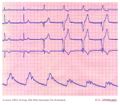File:DVA0923.jpg: Difference between revisions
m →Summary |
m →Summary |
||
| Line 1: | Line 1: | ||
== Summary == | == Summary == | ||
{{Information | {{Information | ||
|Description = In this tracing, Leads I,II III and avR are depicted. The last tracing shows the arterial pressure. This tracing is a clear example of the effect of pacing on blood pressure . Note the marked blood pressure drop initiated by ventricular pacing. Though most patients are not symptomatic, some can experience dizziness, fatigue or even heartfailure by ventricular pacing. These symptoms are called the pacemaker syndrome and are most pronounced by VVI pacing and mostly less prominent in DDD pacing. When VA conduction during VVI pacing is initiated, symptoms can be more pronounced. | |Description = In this tracing, Leads I,II III and avR are depicted. The last tracing shows the arterial pressure. This tracing is a clear example of the effect of pacing on blood pressure. Note the marked blood pressure drop initiated by ventricular pacing. Though most patients are not symptomatic, some can experience dizziness, fatigue or even heartfailure by ventricular pacing. These symptoms are called the pacemaker syndrome and are most pronounced by VVI pacing and mostly less prominent in DDD pacing. When VA conduction during VVI pacing is initiated, symptoms can be more pronounced. | ||
|Category = | |Category = | ||
|Source = W.G. de Voogt, MD, PhD, SLAZ, The Netherlands | |Source = W.G. de Voogt, MD, PhD, SLAZ, The Netherlands | ||
Latest revision as of 21:18, 7 August 2008
Summary
| Description |
In this tracing, Leads I,II III and avR are depicted. The last tracing shows the arterial pressure. This tracing is a clear example of the effect of pacing on blood pressure. Note the marked blood pressure drop initiated by ventricular pacing. Though most patients are not symptomatic, some can experience dizziness, fatigue or even heartfailure by ventricular pacing. These symptoms are called the pacemaker syndrome and are most pronounced by VVI pacing and mostly less prominent in DDD pacing. When VA conduction during VVI pacing is initiated, symptoms can be more pronounced. |
|---|---|
| Category | |
| Source |
W.G. de Voogt, MD, PhD, SLAZ, The Netherlands |
| Date |
2008 |
| Author |
W.G. de Voogt, MD, PhD, SLAZ, The Netherlands |
| Permission |
Creative Commons Attribution Noncommercial Share-Alike License |
File history
Click on a date/time to view the file as it appeared at that time.
| Date/Time | Thumbnail | Dimensions | User | Comment | |
|---|---|---|---|---|---|
| current | 23:08, 22 July 2008 |  | 696 × 610 (448 KB) | MReuland (talk | contribs) | == Summary == {{Information |Description = |Category = |Source = W.G. de Voogt, MD, PhD, SLAZ, The Netherlands |Date = 2008 |Author = W.G. de Voogt, MD, PhD, SLAZ, The Netherlands |Permission = {{by-nc-sa-3.0}} |other_versions = None }} |
You cannot overwrite this file.
File usage
The following 2 pages use this file: